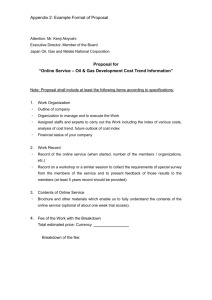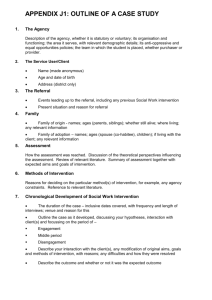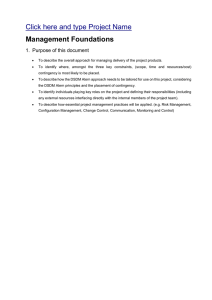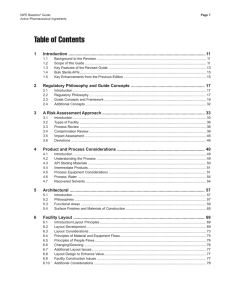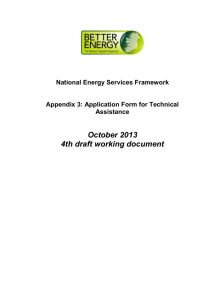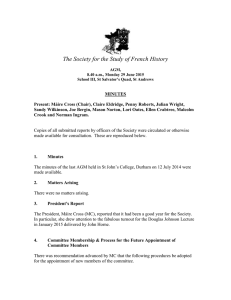Developing an IT Strategy
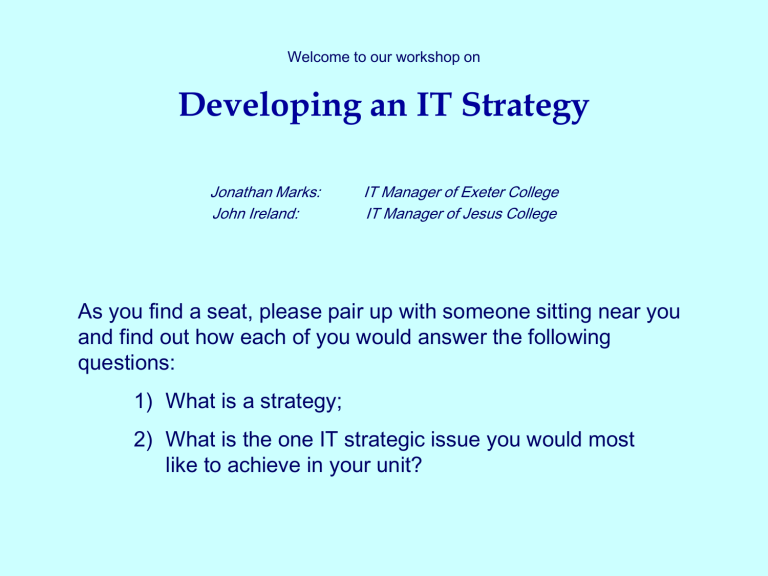
Welcome to our workshop on
Developing an IT Strategy
Jonathan Marks:
John Ireland:
IT Manager of Exeter College
IT Manager of Jesus College
As you find a seat, please pair up with someone sitting near you and find out how each of you would answer the following questions:
1) What is a strategy;
2) What is the one IT strategic issue you would most like to achieve in your unit?
What is a Strategy?
From the New Shorter Oxford English Dictionary:
• The art of a commander-in-chief; the the larger military movements and planning and direction overall operations of a campaign ; an instance or variety of this; of
• The art or skill of careful planning towards and advantage or a desired end ; an instance of this, a stratagem;
• In game theory, business theory, etc., a plan for successful action based on the rationality and interdependence of the moves of opposing or competing participants .
Why develop a Strategy?
Setting a DIRECTION for IT in your unit
Getting SUPPORT from management
Getting required
SPACE
Getting required
FUNDING
Approval for
STAFFING and other
RESOURCES
FINGER POINTING scenarios
Environmental Features
You may need to consider...
But sometimes you will
Overall strategy of the organisation Poorly defined find...
Management structure
Financial / budgetary model
Existing IT strategy
Often no complete formal structure, or many small ‘caveats’
Cloaked approach / hoarding of authority
Systems have usually evolved on a
‘needs must’ basis rather than by plan
How to develop a strategy
Goals
Context
Research
Skeleton
First draft
1. Identify purpose of your strategy
2. Relate to existing environment
3. Gather all required information
4. Sketch out a skeleton document
5. Write the first draft
Who to involve
• Who is on your side? Get them onboard;
• Find people who are respected within your organisation;
• Potentially difficult people – involvement early on can defuse trouble later
– but be aware of dynamics
• Consider who the strategy will be presented to. Whose support will count?
What to include: content
User services Servers / software Students
Research staff
Printing
CD-RW / scanners / etc
Administration
Workstations / software
Skills / training
Conferences / guests
What to include: content (2)
• Finances
– budgets
– schedule of expenditure
– mechanism of funding
• Service levels
– core services?
– additional services?
• Links to other documentation
– IT policies eg. AUP,
SITSAP
– Code of practice
– Disciplinary procedures
Related Topics
Mission Statement
Mission statements are often rather nebulous, but can help to keep a strategy focussed.
IT Strategy
Although “service level agreements” in their strictest sense may not be appropriate, it is still reasonable to define standards of provision.
Service level agreements
Potential Pitfalls and Gotchas
the
“wrecker” too much detail too little detail fixed organisational policies personal hobby-horse boring obscure terminology
BEGINNING
A
How to layout: BME
B C
MIDDLE
D E F
END
G H J
How to layout: client groups
A B C
D E F
G H J
STUDENTS ACADEMICS ADMIN.
CRISIS
How to layout: crisis topics
A B C
D
G
E
H
CRISIS
F
J
CRISIS
Tips and Wrinkles
“He who wants to get his own way prepares the first draft”
Harold Wilson
It was Harold Wilson’s doctrine that you should always write the first draft because that gave you control of what came out in the end;
• Use the word DRAFT!
• Bounce the first draft off someone outside the organisation (eg. a friend);
• Be willing to amend the first draft;
• Allow people to make an input
(or at least think they can);
Tips and Wrinkles (2)
• Put tables, figures, charts in an appendix, and include a glossary;
• If possible, provide a 1 page executive summary;
• Use pictures where they explain better than words;
• Keep it focussed: use the
SMART 1 target paradigm;
• Speak with accountant etc beforehand;
• Carve out time (4 days of elapsed time?);
• Be persistent.
1 SMART: Specified, Measurable, Achievable, Realistic, Time-based
Useful References
• University IT strategy: http://www.ox.ac.uk/it/strategy/
• IT Strategic Framework 2000 (Appendix III) “Suggested guidelines for divisional / departmental IT Strategies” http://www.ox.ac.uk/it/strategy/2000/it014.htm
• IT Strategic Framework 2000 (Appendix V) “College IT Services and Facilities” (really a policy document!) http://www.ox.ac.uk/it/strategy/2000/it016.htm
• Advice on writing a strategy http://www.keele.ac.uk/depts/aa/landt/ltcom/advice.htm
Making a resolution
Please turn back to the person you spoke to at the start of this session, and let them know:
1) Do you intend to put together a strategy?
2) If so, then what steps are you going to take?
What am I going to do now?
TARGET: write down one important thing you want to get out of a strategy;
SPEAK: with someone on your side about wishing to draw up an
IT strategy;
HEADINGS: List the main headings you want to use;
TIME: be sure to set aside some time – book it in your diary.
jonathan.marks@exeter.ox.ac.uk
john.ireland@jesus.ox.ac.uk

